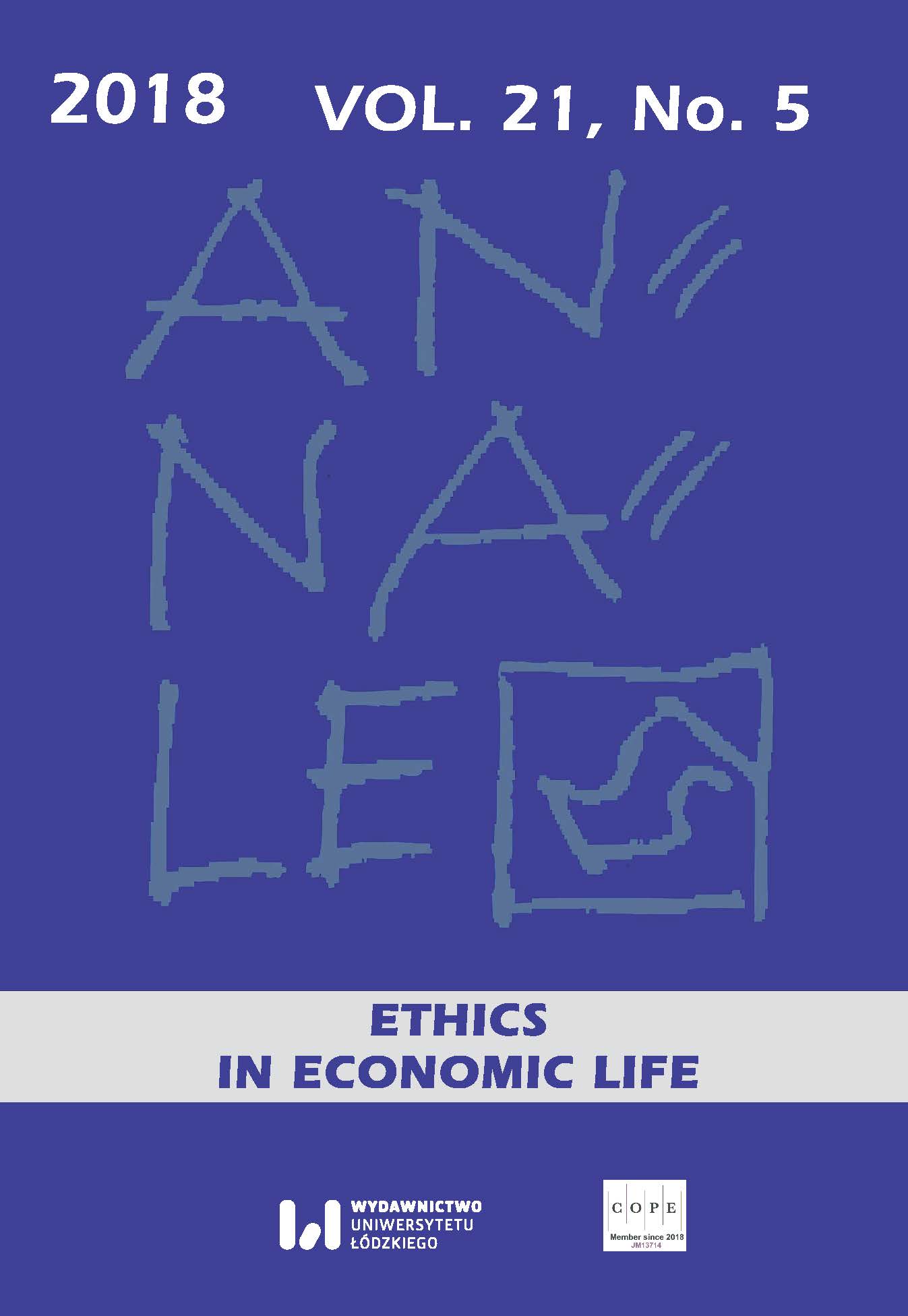The use of modern technology by financial institutions in combating financial exclusion
DOI:
https://doi.org/10.18778/1899-2226.21.5.09Słowa kluczowe:
financial exclusion, financial education, Information and Communication Technologies (ICT)Abstrakt
Financial exclusion can be considered as one of the important problems in countries at the average level of socioeconomic development that include, among others, Poland. It consists in the presence of difficulties in accessing and/or using financial products and services available on the main market that meet the needs of individuals, which prevents them from leading a normal life in society. Due to its own characteristics and trends in financial markets, this phenomenon is closely linked to the issue of the digital divide. Accordingly, it can be seen that solutions leading to the reduction of financial exclusion are based on tools using information technology innovations and modern technologies. One of the methods recognised as the most effective in this area is financial education, aimed largely at children and adolescents, which additionally justifies the choice of such tools. It is equally important to determine the extent to which modern instruments are preferred in comparison with traditional ones. The aim of this paper will be the analysis of the solutions based on modern technologies that are used in actions taken to prevent financial exclusion in selected EU countries, including Poland. The structure of the paper is as follows: the first part will present the problem of financial exclusion (identifying groups particularly at risk), then a review of methods of preventing and combating financial exclusion will be presented, with particular emphasis on modern ICT tools, and the final part will indicate possible directions and barriers to the solutions that may lead to a reduced level of financial exclusion of individuals. The methods used include an in-depth analysis of the literature and a review of existing solutions which financial institutions provide on the Web.
Bibliografia
Alińska, A. (2011). Problem wykluczenia finansowego w Polsce. Zeszyty Naukowe Uniwersytetu Szczecińskiego, 682, 9–22.
Google Scholar
Błędowski, P., & Iwanicz-Drozdowska, M. (2010). Wykluczenie finansowe w Polsce a możliwości przeciwdziałania. Polityka Społeczna, 2, 5–10.
Google Scholar
Cichowicz, E. (2016). Wykorzystanie nowoczesnych technologii przez instytucje finansowe w procesie przeciwdziałania wykluczeniu finansowemu. Annales. Ethics in Economic Life, 19(1), 71–82
Google Scholar
Czapiński, J., & Panek, T. (Eds.). (2014). Diagnoza Społeczna 2013. Warunki i jakość życia Polaków. Warszawa: Ministerstwo Pracy i Polityki Społecznej and Centrum Rozwoju Zasobów Ludzkich. www.diagnoza.com
Google Scholar
Demirguc-Kunt, A., & Klapper, L. (2012). Measuring Financial Inclusion: The Global Findex Database. World Bank Policy Research Working Paper, No. 6025. https://openknowledge.worldbank.org/handle/10986/6042
Google Scholar
European Commission. (2007). Wykluczenie finansowe – zapewnienie odpowiedniego dostępu do podstawowych usług finansowych [Information based on the analysis “Financial services provision and prevention of financial exclusion” prepared by the European Commission]. http://ec.europa.eu/social/BlobServlet?docId=4574&langId=pl
Google Scholar
European Commission. (2008). Financial Services provision and prevention of financial exclusion. http://www.fininc.eu/gallery/documents/final-report-2007-and-summary/financial-services-provision-and-prevention-of-financialexclusion-final-report.pdf
Google Scholar
European Commission. (2012). Special Eurobarometer 373, Retail Financial Services. http://ec.europa.eu/public_opinion/archives/eb_special_379_360_en.htm#373
Google Scholar
Gajda, M. (2010, December 14). Niepełnosprawni finansowo wykluczeni. http://www.niepelnosprawni.pl/le dge/x/78834
Google Scholar
Kapiszewski, J. (2014, November 10 ). Komputer mieczem w walce o pracę. Dziennik Gazeta Prawna, 219.
Google Scholar
Koźliński, T. (Ed.). (2009). Porównanie wyników badań ubankowienia Polaków przeprowadzonych przez NBP w 2006 i 2009 r. Warszawa: NBP.http://www.nbp.pl/systemplatniczy/obrot_bezgotowkowy/ubankowienie_polakow.pdf
Google Scholar
Koźliński, T. (Eds.). (2013, May). Zwyczaje płatnicze Polaków. Warszawa: Narodowy Bank Polski. http://www.nbp.pl/systemplatniczy/zwyczaje_platnicze/zwyczaje_platnicze_Polakow.pdf
Google Scholar
Kubicki, P. (Ed.). (2013). Osoby starsze na rynku usług finansowych. Analiza i zalecenia. Biuletyn RPO, 4. http://www.brpo.gov.pl/sites/default/files/13279229450_0.pdf
Google Scholar
Kuchciak, I. (2011). Bankowość biometryczna – nowe wyzwanie dla polskiego sektora bankowego. Annales Universitatis Mariae Curie-Skłodowska. Sectio H, Oeconomia, 45(2), 225–233.
Google Scholar
Szopa, B., & Szopa, A. (2011). Wykluczenie finansowe a wykluczenie społeczne. Zeszyty Naukowe PTE, 11, 13–27.
Google Scholar
Uryniuk, J., (2012). Aplikacje do zarządzania budżetem domowym coraz bardziej popularne. Gazeta Prawna. http://serwisy.gazetaprawna.pl/finanse-osobiste/artykuly/606230,aplikacje_do_zarzadzania_budzetem_domowym_coraz_bardziej_popularne.html
Google Scholar
Woszczyński, T. (Ed.). (2013). Raport Biometryczny 2.0: Bankowość biometryczna. Warszawa: Grupa FTB ds. Biometrii.
Google Scholar
Ziemba, M., Świeszczak K., & Marcinkowska, M. (2014). Wykluczenie finansowe osób 50+ w kontekście dostępnej oferty bankowej. Finanse,1(7), 145–170.
Google Scholar
http://di.com.pl/oferty-bankow-w-sieci-a-niepelnosprawni-34032
Google Scholar
http://www.biblioteki.org/pl/o_programie/o_programie
Google Scholar
http://www.biblioteki.org/repository/PLIKI/O_FINANSACH/opis_projektu.doc
Google Scholar
http://www.bundesbank.de/Navigation/DE/Bundesbank/Geldmuseum/geldmuseum.html
Google Scholar
http://www.lb.lt/education
Google Scholar
http://www.nbportal.pl/
Google Scholar
https://www.deutschebank.pl/biuro-prasowe/raporty-i-analizy/kategoria-materialy-analityczne/deutsche-bank-research-polacy-ufaja-bankowosci-elektronicznej.html
Google Scholar
Pobrania
Opublikowane
Jak cytować
Numer
Dział
Licencja
Prawa autorskie (c) 2018 Annales. Etyka w Życiu Gospodarczym

Utwór dostępny jest na licencji Creative Commons Uznanie autorstwa – Użycie niekomercyjne – Bez utworów zależnych 4.0 Międzynarodowe.









